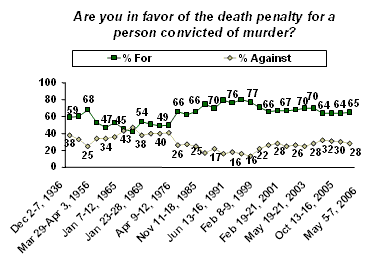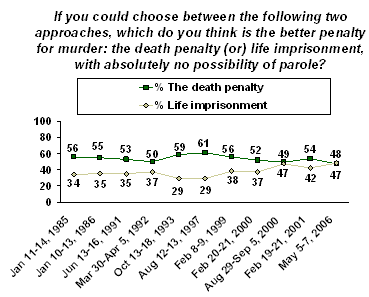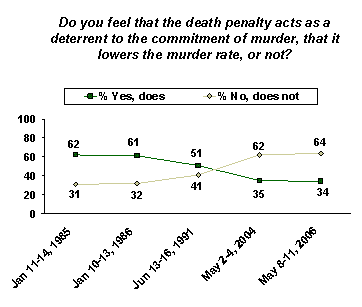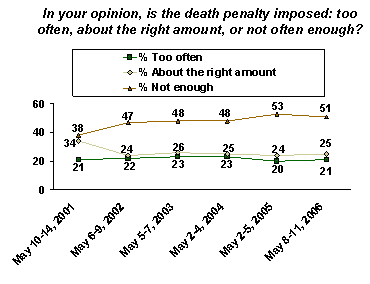GALLUP NEWS SERVICE
PRINCETON, NJ -- Gallup's latest update on support for the death penalty finds most Americans continue to support the execution of convicted murderers. When given an explicit choice between the death penalty and life imprisonment with no possibility of parole, however, Americans divide evenly as to which is the better penalty for murder. Even though Americans believe innocent people have been executed in the last five years and doubt that the death penalty deters people from committing murder, most Americans believe it is applied fairly in this country and say it should be used more often.
Basic Support for the Death Penalty
Sixty-five percent of Americans say they favor the death penalty for convicted murderers, according to a Gallup Poll conducted May 5-7, 2006. This level of support is similar to what Gallup has found over the past three years. Since 2000, roughly two in three Americans have favored the death penalty, with two slightly higher 70% readings in May 2003 and October 2002.

The current level of support is on par with what Gallup measured in the late 1970s and early 1980s, just after the death penalty was reinstated in this country. Support was higher from the mid-1980s to the late 1990s -- consistently above 70% and reaching a high of 80% in September 1994.
More Americans have favored than opposed the death penalty each time this question has been asked since 1936, with just one exception. In a May 1966 Gallup poll, the public opposed the death penalty by a 47% to 42% margin. That reading came as the country was debating the legality of the death penalty. The 1972 Supreme Court ruling in Furman v. Georgia voided all state death penalty statutes. No executions took place in the United States from 1968 to 1976. In 1976 the Court ruled in Gregg v. Georgia that newly written state statutes that addressed the Court's early concerns were constitutional.
Although in principle roughly two-thirds of Americans are supportive of the death penalty, they divide evenly in their preference of life imprisonment with no possibility of parole versus the death penalty as the better punishment in murder cases. Given these explicit alternatives, 47% prefer the death penalty and 48% life imprisonment. Americans have typically shown a slight preference for the death penalty on this measure -- usually just above 50%.

In general, Republicans are more likely to support the death penalty than Democrats, and men are more likely to support it than women. A majority of all these groups say they favor the death penalty for those convicted of murder (84% of Republicans, 63% of independents, and 52% of Democrats; 69% of men and 61% of women).
However, when given the choice of the death penalty or life imprisonment, Republicans choose the death penalty by a 64% to 31% margin, while Democrats choose life imprisonment by a 63% to 31% margin. A majority of men believe the death penalty is the better punishment for murder (56% to 39%), while a majority of women disagree and believe life imprisonment is the better option (55% to 39%).
The Death Penalty in America
In addition to gauging basic public support for the death penalty, Gallup routinely asks questions designed to assess the way Americans feel about some of the specific controversies associated with the death penalty. The public clearly recognizes some of the problems with the use of capital punishment in this country, but on balance still views it positively.
For example, a majority of Americans, 63%, agree with critics of the death penalty that innocent people have been executed under the death penalty in recent years. Only 27% believe this has not happened in the past five years. In two previous measurements, at least 59% of Americans said they think that people have been executed for crimes they did not commit.
Additionally, Americans dispute the notion, espoused by some death penalty proponents, that it deters people from committing murder. Just 34% believe it does, while 64% believe it does not. Americans' attitudes on this have changed dramatically over time -- in the 1980s and early 1990s, most Americans believed the death penalty did act as a deterrent to murder.

Previous Gallup polls have shown Americans support the death penalty because they believe it provides justice ("an eye for an eye") and revenge, not because of its practical effect in deterring future murders.
Despite recognizing that innocent people may have been executed, most Americans still say the death penalty is applied fairly in this country. Sixty percent say so in the most recent poll, conducted May 8-11, and a majority has held this view since Gallup first asked about it in 2000.
Only about one in five Americans believe the death penalty is imposed too often. That sentiment has been consistent over the past six years. Americans are much more likely to believe that the death penalty is not imposed often enough -- 51% hold that view in the current survey, and close to half have done so since 2002. That leaves about one in four Americans who believe the death penalty is used about the right amount of time.

Survey Methods
These results are based on telephone interviews with randomly selected national samples of approximately 500 adults, aged 18 and older, conducted May 5-7 and May 8-11, 2006. For results based on this sample, one can say with 95% confidence that the maximum error attributable to sampling and other random effects is ±5 percentage points. In addition to sampling error, question wording and practical difficulties in conducting surveys can introduce error or bias into the findings of public opinion polls.
Are you in favor of the death penalty for a person convicted of murder?
|
For |
Against |
No opinion |
|
|
% |
% |
% |
|
|
|
|
|
|
|
2006 May 5-7 ^ |
65 |
28 |
7 |
|
|
|
|
|
|
2005 Oct 13-16 |
64 |
30 |
6 |
|
2004 Oct 11-14 |
64 |
31 |
5 |
|
2003 Oct 6-8 |
64 |
32 |
4 |
|
2003 May 19-21 |
70 |
28 |
2 |
|
2002 Oct 14-17 |
70 |
25 |
5 |
|
2001 Oct 11-14 |
68 |
26 |
6 |
|
2001 Feb 19-21 ^ |
67 |
25 |
8 |
|
2000 Aug 29-Sep 5 |
67 |
28 |
5 |
|
2000 Jun 23-25 |
66 |
26 |
8 |
|
2000 Feb 14-15 |
66 |
28 |
6 |
|
1999 Feb 8-9 |
71 |
22 |
7 |
|
1995 May 11-14 |
77 |
13 |
10 |
|
1994 Sep 6-7 |
80 |
16 |
4 |
|
1991 Jun 13-16 |
76 |
18 |
6 |
|
1988 Sep 25-Oct 1 |
79 |
16 |
5 |
|
1988 Sep 9-11 |
79 |
16 |
5 |
|
1986 Jan 10-13 |
70 |
22 |
8 |
|
1985 Jan 11-14 |
72 |
20 |
8 |
|
1985 Nov 11-18 |
75 |
17 |
8 |
|
1981 Jan 30-Feb 2 |
66 |
25 |
9 |
|
1978 Mar 3-6 |
62 |
27 |
11 |
|
1976 Apr 9-12 |
66 |
26 |
8 |
|
1972 Nov 10-13 |
57 |
32 |
11 |
|
1972 Mar 3-5 |
50 |
41 |
9 |
|
1971 Oct 29-Nov 2 |
49 |
40 |
11 |
|
1969 Jan 23-28 |
51 |
40 |
9 |
|
1967 Jun 2-7 |
54 |
38 |
8 |
|
1966 May 19-24 |
42 |
47 |
11 |
|
1965 Jan 7-12 |
45 |
43 |
12 |
|
1960 Mar 2-7 |
53 |
36 |
11 |
|
1957 Aug 29-Sep 4 |
47 |
34 |
18 |
|
1956 Mar 29-Apr 3 |
53 |
34 |
13 |
|
1953 Nov 1-5 |
68 |
25 |
7 |
|
1937 Dec 1-6 |
60 |
33 |
7 |
|
1936 Dec 2-7 |
59 |
38 |
3 |
|
|
|
|
|
|
^ Asked of a half sample |
|||
If you could choose between the following two approaches, which do you think is the better penalty for murder -- [ROTATED: the death penalty (or) life imprisonment, with absolutely no possibility of parole]?
|
The death |
Life |
No |
|
|
% |
% |
% |
|
|
2006 May 5-7 ^ |
47 |
48 |
5 |
|
2001 Feb 19-21 ^ |
54 |
42 |
4 |
|
2000 Aug 29-Sep 5 ^ |
49 |
47 |
4 |
|
2000 Feb 20-21 |
52 |
37 |
11 |
|
1999 Feb 8-9 ^ |
56 |
38 |
6 |
|
1997 Aug 12-13 ^ |
61 |
29 |
10 |
|
1993 Oct 13-18 |
59 |
29 |
12 |
|
1992 Mar 30-Apr 5 |
50 |
37 |
13 |
|
1991 Jun 13-16 |
53 |
35 |
11 |
|
1986 Jan 10-13 |
55 |
35 |
10 |
|
1985 Jan 11-14 |
56 |
34 |
10 |
|
|
|
|
|
|
^ Asked of a half sample |
|||
Generally speaking, do you believe the death penalty is applied fairly or unfairly in this country today?
|
Fairly |
Unfairly |
No opinion |
|
|
% |
% |
% |
|
|
2006 May 8-11 ^ |
60 |
35 |
4 |
|
|
|
|
|
|
2005 May 2-5 |
61 |
35 |
4 |
|
2004 May 2-4 |
55 |
39 |
6 |
|
2003 May 5-7 |
60 |
37 |
3 |
|
2002 May 6-9 |
53 |
40 |
7 |
|
2000 Jun 23-25 |
51 |
41 |
8 |
|
|
|
|
|
|
^ Asked of a half sample |
|||
How often do you think that a person has been executed under the death penalty who was, in fact, innocent of the crime he or she was charged with -- do you think this has happened in the past five years, or not?
|
Yes, happened |
No, has not |
No opinion |
|
|
% |
% |
% |
|
|
2006 May 8-11 |
63 |
27 |
10 |
|
|
|
|
|
|
2005 May 2-5 |
59 |
33 |
8 |
|
2003 May 5-7 |
73 |
22 |
5 |
|
|
|
|
|
|
^ Asked of a half sample |
|||
Do you feel that the death penalty acts as a deterrent to the commitment of murder, that it lowers the murder rate, or not?
|
Yes, does |
No, does not |
No opinion |
|
|
% |
% |
% |
|
|
2006 May 8-11 |
34 |
64 |
2 |
|
|
|
|
|
|
2004 May 2-4 |
35 |
62 |
3 |
|
1991 Jun 13-16 |
51 |
41 |
8 |
|
1986 Jan 10-13 |
61 |
32 |
7 |
|
1985 Jan 11-14 |
62 |
31 |
7 |
|
|
|
|
|
|
^ Asked of a half sample |
|||